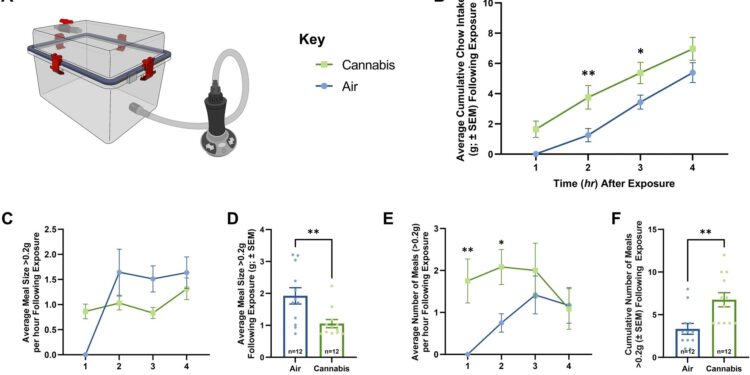Exposure to cannabis vapor increases meal frequency. (A) Illustrates the vapor chamber apparatus used in the following studies. (B), (VS), And (E) Represents the quantification of food ingested at 1 hour intervals following exposure to air or cannabis (not = 12/group), significance calculated with two-way repeated measures ANOVA with Tukey HSD post hoc tests. (D) And (F) Represent mean quantification and cumulative meal patterns (n = 12/group), significance calculated with one-way ANOVA test. (B) shows that free-fed rats exposed to 800 mg of cannabis consumed significantly more food than air-fed rats over a 4-h period. (VS) Shows the average size of a meal per hour after exposure to cannabis and air. Statistical tests revealed significance in the comparison between subjects. Analysis of eating habits revealed that rats exposed to cannabis vapor consumed smaller meals than rats exposed to air (D), and that exposure to cannabis vapor resulted in a trend toward increased total meals per hour compared to air-exposed rats (E), comparison of means revealed significant differences at times 1 and 2 h and in total (F). See Supplementary Tables S1 and S2 for ANOVA test results and post-hoc analysis results respectively. Credit: Scientific reports(2023). DOI: 10.1038/s41598-023-50112-5
While it’s well known that cannabis can cause cravings, researchers have revealed a mechanism in the brain that promotes appetite in a series of animal studies conducted at Washington State University.
The discovery, detailed in the journal Scientific reports could pave the way for refined therapies to treat the appetite disorders faced by cancer patients as well as anorexia and potentially obesity.
After exposing mice to vaporized cannabis sativa, researchers used calcium imaging technology, similar to a brain MRI, to determine how their brain cells responded. They observed that cannabis activated a set of cells in the hypothalamus when the rodents anticipated and consumed tasty foods that were not activated in unexposed mice.
“When mice are given cannabis, neurons activate that are typically not active,” said Jon Davis, assistant professor of neuroscience at WSU and corresponding author of the paper. “Something important happens in the hypothalamus after vaping cannabis.”
Calcium imaging has been used by other researchers to study the brain’s reactions to food, but this is the first known study to use it to understand these characteristics following cannabis exposure.
As part of this research, researchers also determined that the cannabinoid-1 receptor, a known target of cannabis, controlled the activity of a well-known set of “feeder” cells in the hypothalamus called Agouti Related Protein neurons. . Armed with this information, they used a “chemogenetic” technique, which acts like a molecular light switch, to target these neurons when the animals were exposed to cannabis. When these neurons were turned off, cannabis no longer promoted appetite.
“We now know one of the ways the brain responds to recreational cannabis to promote appetite,” Davis said.
This work builds on previous research on cannabis and appetite from Davis’ lab, which was among the first to use vaporized whole cannabis plant material in animal studies instead of injected THC, with the goal to better mimic the way cannabis is used by humans. In previous work, researchers identified genetic changes in the hypothalamus in response to cannabis. In this study, Davis and colleagues therefore focused on this area.
More information:
Emma C. Wheeler et al, Cannabis Sativa targets mediobasal hypothalamic neurons to stimulate appetite, Scientific reports(2023). DOI: 10.1038/s41598-023-50112-5
Provided by Washington State University
Quote: Cannabis found to activate specific hunger neurons in the brain (January 16, 2024) retrieved January 16, 2024 from
This document is subject to copyright. Except for fair use for private study or research purposes, no part may be reproduced without written permission. The content is provided for information only.



